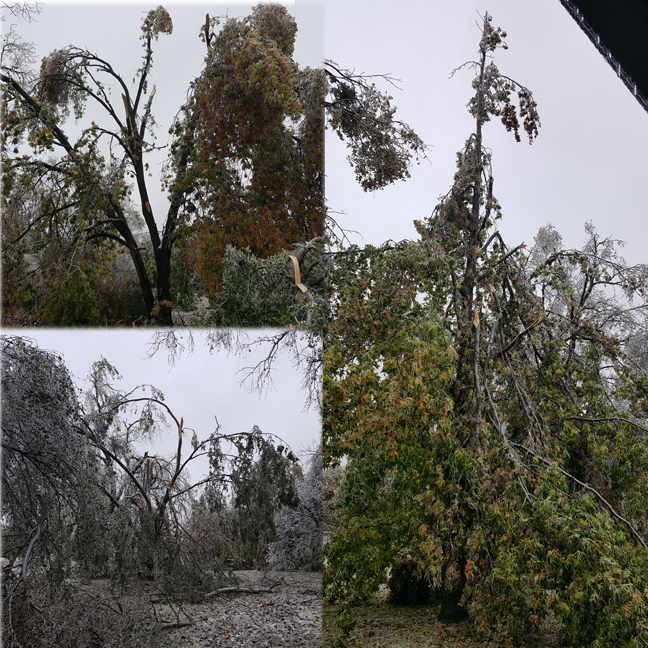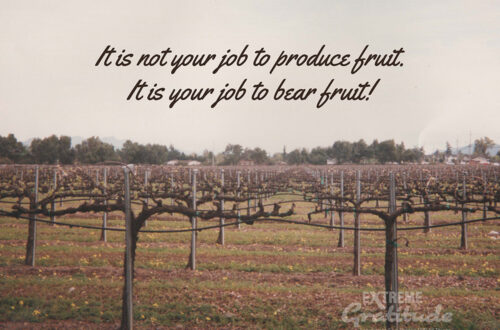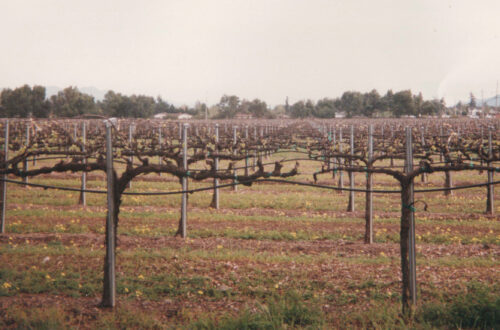You’ve seen the memes. For almost every new disaster in 2020, and there seems to be an on-going stream of them, someone posts: “Who picked ______ for this month in 2020?” And, for Oklahomans in October, it was an “historic” ice-storm. There is so much brokenness. So much destruction. It is a vivid representation of what this year looks like—how it will likely go down in the history books.
How can we fix it? There may be some people who can’t physically address the damage in their yard and can only pray that someone trustworthy comes to help. Some may have family and friends they can call on (if they will). For most of us, though, it means getting out and doing—just fixing the problem.
Looking out at it from inside the house, it is a mess. It’s almost overwhelming. While the storm was going on, you had to be very careful if you went outside. We have so many trees, it is not easy to move around the yard and not be under a tree. And you did not want to be under a tree with all that ice. I stood at the windows several times during the three days of freezing rain trying to figure out what it would take to clean it up and where to begin. At times it felt heart-breaking. Other times, I could only shake my head and realize, this is one more “thing” to add to the list of “all things” that God is using for His glory and my growth, for which I can be thankful.
- Lesson 1—”Always giving thanks for all things in the name of our Lord Jesus Christ to God, even the Father.” Ephesians 5:20
I started on the chainsaw portion of the clean-up in our yard on Thursday. In the middle of our yard, you are totally surrounded by the destruction. It’s all you can see. But when I get outside our own yard, out on the street, and look around—I see it in our neighbors yards as well.
- Lesson 2—You are not the only one in pain. Not all the pain in the world is in your yard, or your household, or your church. Get outside your walls and look around. There are needs out there, too.
- Lesson 3—For the church: Here is your opportunity to show love. Love your “one anothers.” If you will get out, as a group of believers, and go help your fellow Christians make short work of cleaning up their own yards, you will demonstrate the love of Christ before their lost neighbors, and those neighbors will know you are His disciples—and they will be confronted with the truth that He lives and He loves. Church! This is evangelism! (one form of it). Jesus said, “By this will all men know you are my disciples, when you love one another.” This does not mean turning to the person next to you on the pastor’s command on Sunday morning and telling them you love them or saying some other encouraging spiritual tidbit. This means loving them! And, if the only time we do it is inside the four walls of the church, once a week on Sunday morning, how do we think “all men” are going to see it, much less be able to detect we are Jesus’ disciples because of it!?!?!?
- Lesson 4—For individual believers: Love your neighbor as you love yourself. Do you love yourself enough to get out and clean up your yard? Then, yes, you love yourself. Now, go and love your neighbors the same way. That’s all it means. “As” means “in the same way.” You love you. You love you enough to clean up your yard. Love your neighbor the same way—especially your lost neighbor, and those who cannot help themselves—the sick, elderly and widows.
This is 2020. The year is going to take on a meaning all its own, right? You know exactly what I mean by “this is 2020.” One problem, one disaster, one troubling headline after another. Some have proven to be more of a problem than others, but it’s been a rough year. I mean, really—two, think about it, two hurricanes making landfall within 12 miles of each other in south Louisiana within just a few weeks of each other! An ice storm, of historic proportions, in Oklahoma, in October?!? And these events are just the punctuation marks exclaiming how the rest of the year has gone!
As I go out to clean up the damage in my yard, what do I do? There is hardly a tree in the yard that is unbroken. Trish and I went outside Wednesday and we did find a few that were bent over, one with the top laying on the ground. We knocked as much of the ice off the leaves as we could, and by Thursday afternoon they had straightened back up. But all the others? (Sitting here, I can envision at least 30 trees in our yard with ice damage, ranging from 3 or 4 inches to 2 or 3 feet in diameter). We should just cut them all down and start over, right?
Um,
no.
Cutting down, cutting up and removing all those trees just because they are damaged? Would create far more work, not to mention pain for myself and Trish, than addressing the specific problems and dealing with them. Of all those trees, there is one, maybe two, that are so damaged that the best solution may be to take them out completely. The others are worth the time and effort to fix them.
We clear the broken off limbs from the ground around the trees to make room to work. Then we find the severed limbs leaning on or hanging in the tree, and pull them down as carefully as possible and cut them up and clear them out. Then we cut off the broken limbs and remove them. There are some severed and broken limbs too high to reach. I’ve rented a tow boom in the past to take care of things like this. Hopefully I will be able to do so again. It may be next Spring or Summer, but eventually, we will get it all cleared up. In the meantime, the trees will survive this severe pruning and grow back. That process may take years, but eventually, this damage will be hidden under new growth, new life.
- Lesson 5—Growth, change, fixing broken things, healing, restoration—It’s a process, and as such, it takes time. It’s worth it.
- Lesson 6—If we would take that same approach to relationship problems with people, there would be so much less heartache in the world. The divorce rate would plummet. Race relations would virtually cease to be an issue.
I could probably go on, but you get the picture. Besides, this is getting long, and to continue, my list of “lessons” would become more of a stretch.




